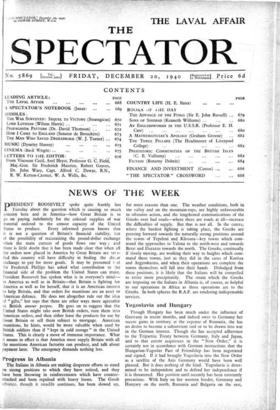NEWS OF THE WEEK
PRESIDENT ROOSEVELT spoke quite frankly last "Ilesday about the question which is causing so much concern here and in America—how Great Britain is to go on paying indefinitely for the colossal supplies of war material' ordered to the utmost capacity of the United States to produce. Every informed person knows that it is not a question of Britain's financial stability, but of the possibility of maintaining the pound-dollar exchange when the main current of goods flows one way ; and there is little doubt that it has been made clear that when all the orders now placed in America by Great Britain are sat s- fled this country will have difficulty in finding the doi,ar exchange to pay for more goods. It may be presumed t•-at Sir Frederick Phillips has asked what contribution to the financial side of the problem the United States can make. President Roosevelt has spoken what is in everyone's mind— in America as well as in Britain—that Britain is fighting for America as well as for herself, that it is an American interest to help Britain, and that orders for munitions are an asset to American defence. He does not altogether rule out the idea of " gifts," but says that there are other ways more agreeabie to British amour pro pre. He goes on to suggest that the United States might take over British orders, turn them into American orders, and then either lease the products for use by Great Britain or sell them subject to mortgage. American munitions, he hints, would be more valuable when used by British soldiers than if " kept in cold storage " in the United States. This is clearly a move of immense importance. What it means in effect is that America must supply Britain with all the munitions American factories can produce, and talk about payment later. The emergency demands nothing less.


























